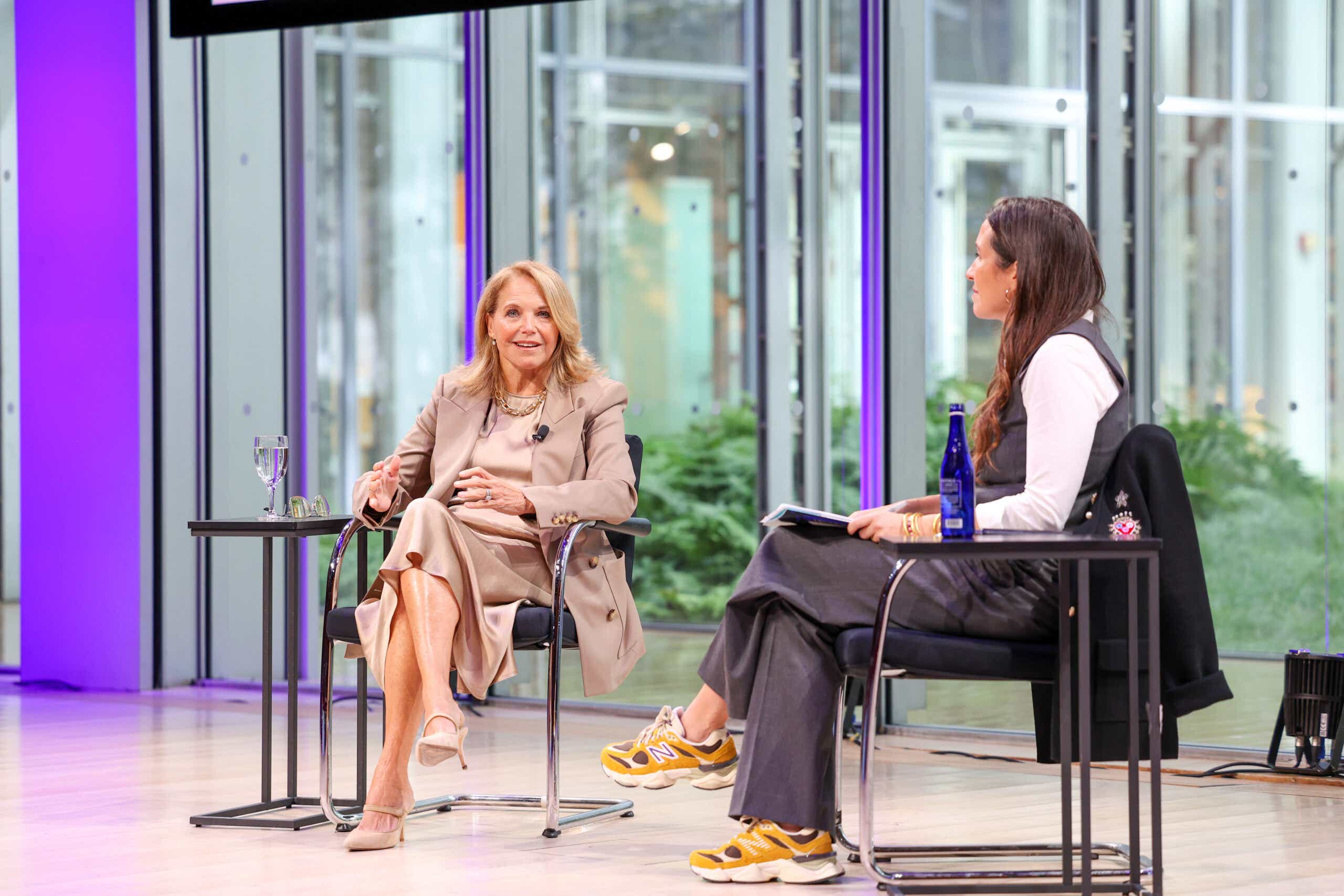This week, Katie took the stage at the Consensus Great Brands Show, an annual convention bringing together emerging companies and giving them a chance to showcase their exciting, new products.
While she's a master interviewer, she was in the hot seat this time. Tara Foley, who founded the beauty brand Follain and is now a managing director at Consensus, interviewed her about her beginnings in journalism, what it took to start Katie Couric Media, her history of advocacy, and more. Here are a few key moments from their captivating conversation, and a recap of what Katie Couric's been up to in recent years. (Spoiler alert: She's kept quite busy.)
Tara Foley: What originally drew you to sharing important stories? How did you know you had what it takes to be an anchor?
Katie Couric: I never really wanted to be an anchor. My whole career was really focused on being a reporter. In fact, many people said I wasn’t anchor material because I didn’t look like a quintessential Junior Miss contestant. But I love journalism; it’s really been a calling for me. My father was a print journalist, and I think he saw that I could write quickly and pretty well, so he really encouraged me. I love to write, and couple that with this insatiable curiosity I’ve always had about people and their stories — it just made sense. I just love my work. I’m one of those people who has never felt work was work because I’m a lifelong learner, and in this profession, I’ve been able to learn something new every day. I’ve met extraordinary people who are at the top of their fields, from authors to politicians to fashion designers and entrepreneurs. It’s been a really wonderful journey for me.
Throughout your career, you’ve chosen to share some very personal health issues with your audience — before anybody was really doing that. I think all of the founders here today would like to hear about the courage it took to do that and why you believe it’s important to continue doing that.
I lost my husband, Jay, in 1998 from colorectal cancer. He was 42 years old, I was 41, and our daughters were six and two. It was a horrific experience. I think when someone you love is sick and there's nothing you can do about it, you feel so powerless. But I had this platform, The TODAY Show, where millions of people watched me every morning and knew what I was going through. And I felt it would be almost criminal not to take advantage of that fully and inform people about colon cancer screening. So I decided to get a colonoscopy on air. I mean, nothing says good morning like a look at my colon at 7:30 a.m. But it did have an impact, and I think it gave purpose to our loss.
Then, two years ago, I got diagnosed with breast cancer, and now I'm on a tirade about women with dense breasts getting the additional screening they need. Over 40 percent of women 40 and over have dense breasts, and mammograms alone don't necessarily identify if you have an abnormality. So I was on Capitol Hill a couple of years ago with Congresswoman Rosa DeLauro to talk about a bill that’s been introduced called the Find It Early Act, which will ensure insurance companies cover this type of care. And with Stand Up To Cancer, we’ve raised $800 million to fund scientists who’ve developed nine new FDA-approved drugs like Keytruda. I feel like this has been my North Star ever since losing Jay, and I’ll do everything I can to reduce the number of deaths from cancer in this country.
With Katie Couric Media, you chose to amplify brands, in addition to your newsletters and podcast. I’d love to hear an example of a brand story that you worked on recently.
In 2018, we saw that trust in institutions was declining, whether you’re talking about the government or the media writ large, while trust in companies was actually increasing. More brands were getting into storytelling than ever before, and we thought, if we’re aligned with purpose-driven brands and they care about the same issues that we care about, why can’t we work together? One example is our partnership with Exact Sciences, an incredible company out of Madison, Wisconsin, that’s developing cancer-screening tools. Because I care so deeply about this issue, it was really a perfect fit for us.
You’ve clearly been a trailblazer so many times over. But you recently wrote an op-ed about how we seem to be taking a step backward in terms of female leadership in media.
I graduated from UVA in 1979, and I always say that when I got into TV news, “harass” was two words instead of one. So, we’ve come a long way, but today, the anchors of all three major networks are male. I think this is a case of representation really mattering. I left a pretty sweet position at The TODAY Show because I thought it was important for viewers to see that a woman could [anchor the CBS Evening News]. I had a lot of challenges. People gave me a hard time after my first night — they criticized me for wearing a white jacket after Labor Day, and I was like, "It’s Armani!" They criticized the way I held my hands, they criticized my makeup. But I did it because I wanted to break the mold.
Now they’ve gone back to all men. And even though it’s at a moment when the evening newscast matters less and less because of the fragmentation of the media landscape, it’s still discouraging that the management didn’t think about what it was saying to return to an all-male newscast.
This interview has been edited and condensed for clarity.









